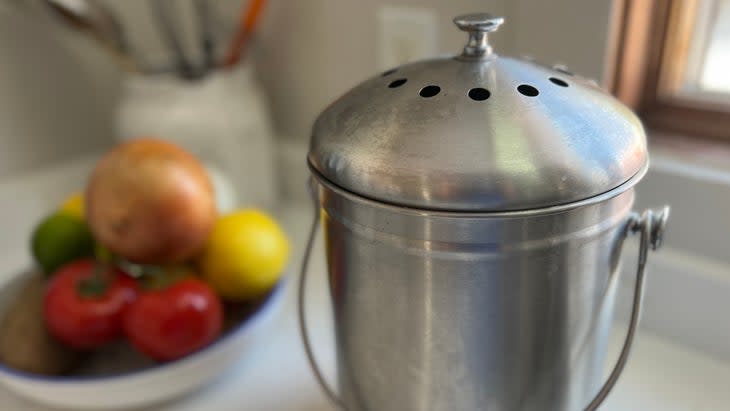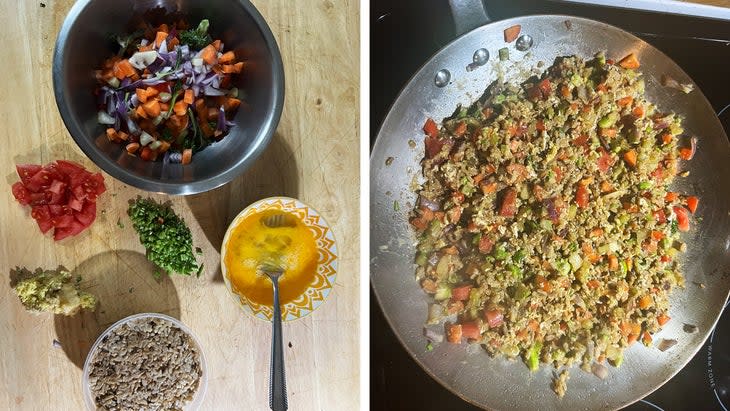The Best Thing You Can Do for the Planet Is So Easy: Stop Throwing Away Food
This article originally appeared on Outside
Doing right by the planet can make you happier, healthier, and--yes--wealthier. Outside's Head of Sustainability, Kristin Hostetter, explores small lifestyle tweaks that can make a big impact. Write to her at climateneutral-ish@outsideinc.com.
Until I started backyard composting last spring, I had no concept of how much food my family wasted. I bought a silver scrap bin to put on my counter and started tossing in carrot and potato peels, onion skins, broccoli stems, pineapple and apple cores, even the slimy spinach I found in the back of my fridge and the half bag of shriveled, yellowish celery that I never got around to using.
Sure, my scraps were destined for the compost heap, where they would transform into a good thing: nutrient-rich soil for my garden. But I couldn't hide from the truth of the silver bucket: I was wasting a crap-load of food.
And it's not just me. Food waste is a massive problem in the U.S. Consider these hard-to-swallow facts:
>We waste about 40 percent of our food, more than any other country in the world.
>The average American tosses out around 230 pounds of food per year, nearly 1/3 of what they buy.
>34 million people in the U.S. are food insecure.
>Food accounts for 24 percent of solid waste in our landfills.
>Only about four percent of food waste gets composted.
>Annual food waste methane emissions are equal to what about 37 million cars or 42 coal-fired plants spew out.
>The environmental and social reasons for curbing our food waste are pretty clear. But there's also a legit cost savings. According to ReFed, the average American family wastes $1,229 worth of food each year.
And when food gets wasted, so, too, do all the resources that went into producing it, like water, grain, and fuel for tractors and machinery.

I decided I needed to tackle my food waste problem at its source, so I hit up the Zero-Waste Chef Anne-Marie Bonneau for some tips. The good news? Her advice was not daunting. I didn't have to make big, wholesale changes to my diet or lifestyle, and I immediately started saving money at the grocery store. And that silver scrap bin on my countertop? These days, it's been much slower to fill.
5 Easy Things You Can Do To Reduce Food Waste (and Save Money)
"Shop" Your Kitchen
How often do you open the fridge and say we have nothing to eat? So you think about what you're craving, maybe find a recipe, make a shopping list, and hit the market.
"Instead of letting your cravings dictate what you cook, let the contents of your fridge do it," says Bonneau. "Kind of like the TV show Chopped, but without the mean judges or the ticking clock. You probably have leftover rice or pasta, some random veggies, a couple of eggs, a little bit of sauce. There's so much you can do with that!" She's talking about things like fried rice, stir fries, soups, or frittatas. Bonneau suggests having just a few versatile recipes in your arsenal that allow you to sub in whatever you have on hand. "You'll become a more confident cook, slash your food waste, and save a fortune."

Cook Appropriate Portions--and Eat Your Leftovers
Last week I was craving minestrone soup in a big way, so I doubled my favorite recipe and made enough to feed a houseful. It hit the spot. Problem was, I did not have a houseful. I chipped away at that big pot for the next few days but it just wouldn't go away. I considered freezing it, but decided I couldn't face that last bowl or two and would never want to. So I ended up tossing it. Yes, I felt guilty. And I probably won't cook minestrone again until 2024.
Bottom line: Don't cook for an army if you don't have one. And eat any leftovers the next day, when they'll be most appetizing.
Ignore Expiration Dates
"Best By," "Use By," "Sell By." These words are stamped on everything from milk and eggs to cans of beans and boxes of pasta, even cans of Coke. Many people believe those dates come from some benevolent national regulator, like the FDA, designed to prevent food poisoning. Nope. They come from the manufacturer, who wants you to eat their food when it will taste best so you'll like it, or--more nefarious--throw it out once the date passes, then run back to the store to buy more.
"Don't be fooled," says Bonneau. "An unopened tub of yogurt will stay good long past its sell by date. Use your senses. If it looks fine, smells fine, and tastes fine, it is fine."
Hoard Your Glass Jars
I'm never buying a piece of Tupperware again. Jars, which Bonneau calls her favorite zero-waste tools, are far superior for storing leftovers because you can see what's inside and are less likely to forget about it. They're also ideal for the freezer, for bringing to the store when shopping the bulk aisle (just don't forget to get the jars weighed before you fill them or you'll pay extra), and for organizing your pantry so you can easily see what you have, and use it. When you go to a restaurant, bring a few jars and pack your leftovers, so you can skip the plastic takeout containers, which may or may not be recyclable.
And you don't have to buy cases of fancy mason jars, just upcycle the peanut butter, pickle, or jam jars you're already buying. Bonneau has some tricks for removing labels and odors, so your upcycled jars will be shiny and new.
Start Composting
If you're not already doing it, you've probably been thinking about it. It's not that scary! And composting what you can't eat is simply one of the best things an individual can do for the planet. When we send our food to the landfill (which is designed for storage, not decomposition), it gets buried under more crap, which means it can't breathe and therefore can't decompose. Instead, it releases methane, which is really bad--like 30 times worse than CO2.
If you have a backyard and love gardening like me, composting is fun and fascinating, like a good 6th grade science project. Here's a great beginners guide to composting. If you don't have the space, and your community doesn't collect food scraps in a green bin system, you could hire a composting service, find a local community garden to donate scraps to, or invest in an electric composter like a Lomi (I'm currently testing one out and will report back soon.)
Kristin Hostetter is the Head of Sustainability at Outside Interactive, Inc. and the resident sustainability columnist on Outside Online.
For exclusive access to all of our fitness, gear, adventure, and travel stories, plus discounts on trips, events, and gear, sign up for Outside+ today.

